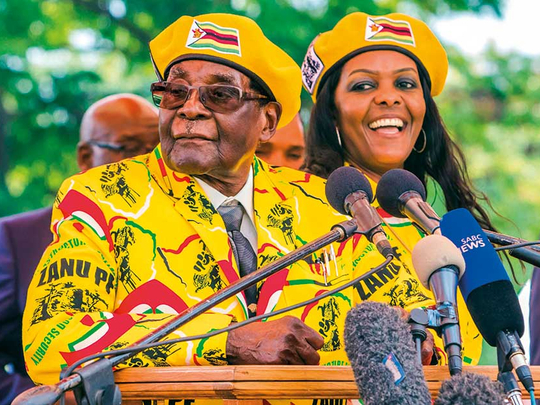
The struggle to oust Robert Mugabe from power in Zimbabwe dominated the headlines. There was unanimity of opinion on the need to end Mugabe’s 37 years of misrule, but there were apprehensions over the army’s and Emmerson Mnangagwa’s roles in bringing about a change in the country’s governance.
The Guardian said the crisis has been a long time coming as Mugabe has destroyed his own status as an icon of liberation by reducing his country to such dire economic and political straits.
In an editorial the British paper said: “The question of succession was so fraught that it perhaps extended his reign: no one wanted to precipitate the choice when they hoped they might manoeuvre their way to the top. But the issue could not be deferred forever: at 93, the world’s oldest head of state has been visibly ailing. Last week, he ejected Mnangagwa from the vice-presidency, clearing the way for his wife, Grace, to take charge – and triggering these events.
“Yet the prospect of President Mnangagwa is hardly a cause for celebration. His long years as Mugabe’s chief enforcer tell one much of what we need to know about his record. The nickname he earned, “the Crocodile”, says the rest, the paper added.
Striking an optimistic view, the paper said: “It is more likely that Mnangagwa will try to boost support through better management, seeking to stabilise the economy and woo foreign money – perhaps while relying on increased coercion to maintain his position if necessary.”
Mugabe’s fall from power would be well worth celebrating – were it not for the manner of his exit and the danger it presents for his woefully mismanaged country, Bloomberg said.
“Africa’s military coups have rarely given rise to democratic constitutional order, so it’s hard to be optimistic. Still, Mugabe has set the bar for political progress about as low as it can go. It wouldn’t be hard for his successor to ease the country’s suffering, and the new leader should be encouraged to make that his priority,” the wire service said in an editorial. “The longer the military remains in control, the worse Zimbabwe’s prospects. A speedy, orderly return to civilian control is essential,” it added.
The New York Times said Mugabe’s refusal to quit after more than three decades of despotic rule was bound to be a major disappointment to his countrymen despite the ruling Zanu-PF party expelling him as its leader and ordering him to resign by noon Monday or face impeachment.
“How the ouster plays out, and whether Mugabe’s most likely successor, Emmerson Mnangagwa, proves to be less authoritarian, remain major questions. But for now, the military’s decision to intervene while not taking power outright was preferable to a coup d’etat. It is better for Zimbabwe, which has known only one leader since the end of white-minority rule, and for Africa, where many countries are under despotic “big man” rule, that the expulsion of Mugabe follow constitutional and democratic norms, even if the military has run roughshod over those norms for years, and may do so yet again,” the paper said in its editorial.
Zimbabwean newspaper Newsday said the military’s intervention was critical and timely since the economy was crumbling. “There is no doubt that Zimbabweans have suffered enough under Mugabe’s misgovernance, and there must come a time when someone must stop him for the good of the country, the paper said in an editorial.
Calling for preparations for next year’s general elections, the paper said the country should focus on rebuilding the economy. “The current developments in the country should mark the beginning of a new era. The situation now requires all Zimbabweans to come together regardless of political affiliation and map the way forward. We believe this must be an era of reconstruction. The era of politics of hatred, selfishness, violence and murder must now be buried for good,” it added.




_resources1_16a31069e4e_small.jpg)







